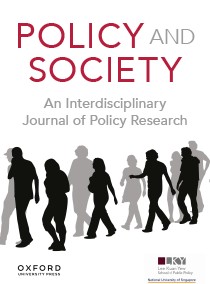治理修复?关于管理人工智能生成器的争议中的权力与政治
IF 5.7
1区 社会学
Q1 POLITICAL SCIENCE
引用次数: 0
摘要
2022 年底推出的 ChatGPT 引发了有关生成式人工智能(AI)治理的重大争议。本文研究了首批专门针对生成式人工智能的国际治理和政策倡议:七国集团广岛进程、经济合作与发展组织报告和英国人工智能安全峰会。本文的分析参考了政策框架和治理方面的文献,特别是技术治理和负责任创新方面的工作。新兴的生成式人工智能治理呈现出多中心治理的特点,即多个重叠的决策中心处于合作关系之中。不过,这种治理主要由少数发达国家主导。对生成式人工智能的治理大多以风险管理为框架,在很大程度上忽视了创新的目的和方向问题,赋予公众的作用也相当有限。我们可以看到一个 "生成式人工智能治理的悖论 "正在形成,即虽然这项技术正在被公众广泛使用,但其治理范围却相当狭窄。本文创造了 "治理修复"(governance fix)一词,以捕捉这种治理生成式人工智能的相当狭隘和技术官僚的方法。作为一种替代方案,本文建议采用多中心治理和负责任创新的政治方式,强调以民主和参与的方式共同塑造技术,以造福社会。生成式人工智能的权力高度集中于少数大型科技公司,权力分配极不平等,在这种情况下,政府在重塑权力失衡方面可以发挥特殊作用,让公众广泛参与生成式人工智能的治理。本文章由计算机程序翻译,如有差异,请以英文原文为准。
Governance fix? Power and politics in controversies about governing generative AI
The launch of ChatGPT in late 2022 led to major controversies about the governance of generative artificial intelligence (AI). This article examines the first international governance and policy initiatives dedicated specifically to generative AI: the G7 Hiroshima process, the Organisation for Economic Cooperation and Development reports, and the UK AI Safety Summit. This analysis is informed by policy framing and governance literature, in particular by the work on technology governance and Responsible Innovation. Emerging governance of generative AI exhibits characteristics of polycentric governance, where multiple and overlapping centers of decision-making are in collaborative relationships. However, it is dominated by a limited number of developed countries. The governance of generative AI is mostly framed in terms of the risk management, largely neglecting issues of purpose and direction of innovation, and assigning rather limited roles to the public. We can see a “paradox of generative AI governance” emerging, namely, that while this technology is being widely used by the public, its governance is rather narrow. This article coins the term “governance fix” to capture this rather narrow and technocratic approach to governing generative AI. As an alternative, it suggests embracing the politics of polycentric governance and Responsible Innovation that highlight democratic and participatory co-shaping of technology for social benefit. In the context of the highly unequal distribution of power in generative AI characterized by a high concentration of power in a small number of large tech companies, the government has a special role in reshaping the power imbalances by enabling wide-ranging public participation in the governance of generative AI.
求助全文
通过发布文献求助,成功后即可免费获取论文全文。
去求助
来源期刊

Policy and Society
Multiple-
CiteScore
18.00
自引率
6.50%
发文量
43
审稿时长
30 weeks
期刊介绍:
Policy and Society is a prominent international open-access journal publishing peer-reviewed research on critical issues in policy theory and practice across local, national, and international levels. The journal seeks to comprehend the origin, functioning, and implications of policies within broader political, social, and economic contexts. It publishes themed issues regularly and, starting in 2023, will also feature non-themed individual submissions.
 求助内容:
求助内容: 应助结果提醒方式:
应助结果提醒方式:


